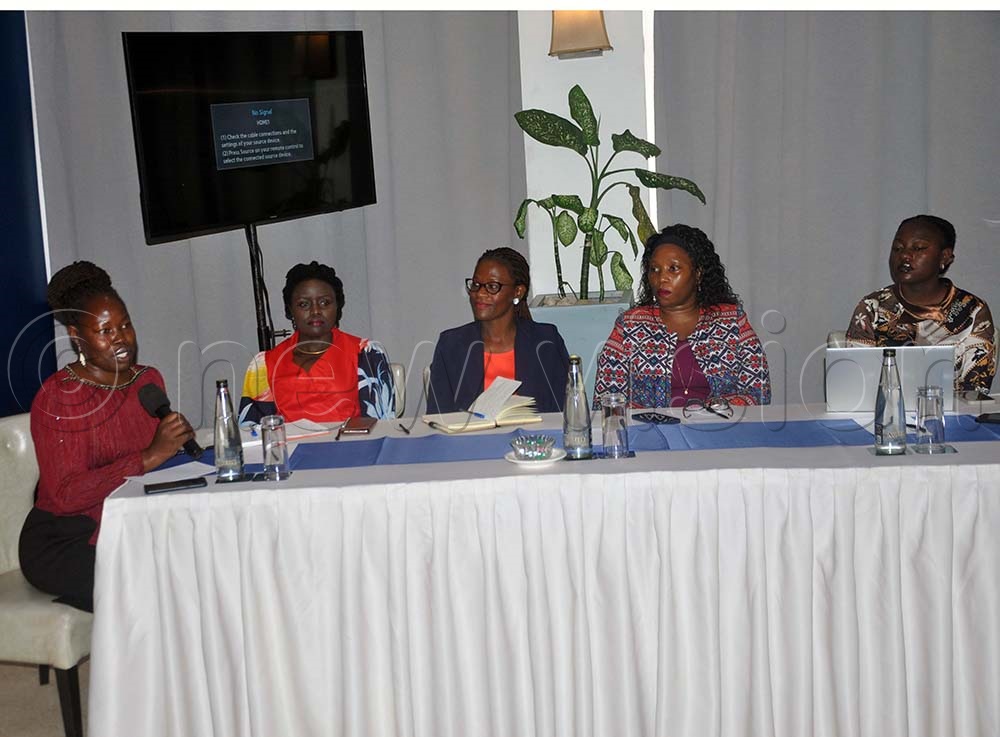Women-led groups want stronger collaboration for collective advocacy
During the discussion NAWOU programme officer Lucy Imaligant highlighted the importance of co-ordination. She said while many women-led organisations are doing good work, they often operate in isolation.
Leaders of women-led organisations during the strengthening collective advocacy through cluster-based approaches discussion held at the Golden Tulip Hotel, Nakasero, Kampala. (Credit: John Odyek)
John Odyek
Journalist @New Vision
Women-led civil society organisations (CSOs), NGOs and community-based organisations (CBOs) in Uganda have called for greater collaboration among female groups to strengthen their collective advocacy and secure better outcomes for women.
These organisations emphasised the need for more unity to overcome gender-based barriers and the challenges facing communities.
Many women-led groups report that they are often excluded from important policy decisions, despite having the expertise and capacity to make meaningful contributions.
They believe that by pooling their strengths, they can tackle these issues more effectively and drive real change for women.
National Association of Women's Organisations in Uganda (NAWOU) programme manager Monica Nantume said collaboration and a unified voice on key issues are crucial to achieving the goals of women-led organizations.
In 2022, GIZ extended financial support to NAWOU to enhance co-ordination among women-led organisations. This initiative aimed to foster a cluster-based approach to key issues, enabling joint advocacy while working with government ministries and agencies.
The clusters are; leadership and governance, environment and climate change, peace and society, women economic empowerment.
The Equal Opportunities Commission and the National Planning Authority have also joined efforts to promote closer collaboration between women-focused CSOs.
This was revealed during a panel discussion on strengthening collective advocacy through cluster-based approaches on March 18, 2025, at the Golden Tulip Hotel in Kampala city was organised by NAWOU and attended by representatives from 56 women-led organisations.
Leaders of women-led organisations discussing during the strengthening collective advocacy through cluster-based approaches discussion held at the Golden Tulip Hotel, Nakasero, Kampala. (Credit: John Odyek)
Co-ordination
During the discussion NAWOU programme officer Lucy Imaligant highlighted the importance of co-ordination. She said while many women-led organisations are doing good work, they often operate in isolation.
“When we collaborate, we can leverage data, share resources, and amplify our impact,” Imaligant explained.
Carol Nyangoma Mukisa, the executive director of the Warm Heart Foundation, pointed out that women’s voices are often ignored in policy development, despite being called upon to advocate for issues affecting them.
“Women’s access to justice, economic justice, and peace are human rights issues. Civil society organisations know the struggles of our communities,” Mukisa said. She expressed concern about the financial hurdles CSOs face during registration with local authorities and the NGO Registration Board.
Vaal Beatrice Namugga, the programmes officer at Katosi Women Development Trust, discussed the value of shared spaces for women-led organizations.
“Effective coordination helps us address critical issues like climate change and agricultural rights. By engaging with ministries, we can improve women’s lives,” Namugga noted.
Phiona Kanyange, the project co-ordinator at FIDA Uganda, emphasized that leadership for women often faces cultural and institutional challenges.

Inclusion
“Even though women make up 52% of Uganda’s Parliament, we are not always included in decision-making on issues that directly affect us,” Kanyange said. She called for a gender-neutral leadership curriculum and mentorship programs to empower future female leaders.
Challenges were raised regarding the local government's reluctance to partner with civil society, with some authorities mistakenly assuming CSOs have unlimited resources.
“Government and CSOs should see each other as allies, not competitors,” remarked Lydia Naluwende, the principal community development officer at the gender ministry. “When CSOs work with the government, the results can be transformative.”
Rose Jenifer Asiyo, the planner at the National Planning Authority, echoed Naluwende’s sentiments, highlighting that co-ordinated efforts reduce duplication and improve outcomes.
“Clustering is a highly effective way to align our efforts, streamline reporting, and show tangible progress,” Asiyo said.
Irene Nafumba, the principal compliance officer at the Equal Opportunities Commission, stressed the importance of clear objectives and strong communication within clusters for success. Nafumba suggested that creating a culture of continuous reflection and collaboration could lead to greater impact.
Moreen Twikirize, the country director of the Youth Advocacy and Development Network (YADNET) Uganda, called for advocacy boot camps to train women in strategic advocacy. Twikirize proposed the creation of collaborative digital ledgers to enable real-time reporting and sharing of insights on challenges and successes.
The consensus at the event was that enhanced collaboration and a collective voice are critical to overcoming the barriers women face in Uganda and driving change.